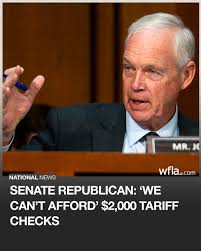 Republican Sen. Ron Johnson (Wis.), a leading fiscal hawk in the Senate, says the country “can’t afford” President Trump’s proposal to send out $2,000 tariff “dividend” checks to working-class Americans to help them afford higher living expenses.
Republican Sen. Ron Johnson (Wis.), a leading fiscal hawk in the Senate, says the country “can’t afford” President Trump’s proposal to send out $2,000 tariff “dividend” checks to working-class Americans to help them afford higher living expenses.
By Alexander Bolton
“Look, we can’t afford it. I wish we were in a position to return the American public their money, but we’re not,” Johnson told Fox Business’s Maria Bartiromo.
“We’ll have at least a $2 trillion deficit this year,” Johnson warned, comparing the staggering national deficit projected for 2025 to smaller deficits under former President Obama and during Trump’s first term.
“President Trump had deficits about $800 billion. Obama, in his last four years, $550 billion a year. Now we’re $2 trillion? Completely unacceptable. We have to start focusing on that and doing something about it,” Johnson said.
Trump has proposed paying out $2,000 tariff dividend checks to millions of Americans and funding it with the hundreds of billions of dollars in revenue projected to enter federal coffers because of higher tariffs.
But budget experts project the inflow of new tariff revenue won’t be enough to cover the costs of doling out $2,000 checks, which could cost $600 billion per year, according to the Committee for a Responsible Federal Budget, a nonpartisan group that studies fiscal issues.
The Treasury Department estimated in July that it could collect $300 billion this year from higher tariff rates, and the Congressional Budget Office estimates the federal government could collect about $2.8 trillion over 10 years.
Distributing $2,000 tariff rebates to millions of Americans would cost approximately $6 trillion over 10 years, if those checks are sent out on an annual basis.
Treasury Secretary Scott Bessent said earlier this month that the administration would limit those payments to people making below a certain amount in annual income.
Trump said the checks would go to “individuals of moderate income,” likely “in the middle of next year.”
Congress would need to pass legislation to authorize the payments.
Senate Majority Leader John Thune (R-S.D.) told reporters last week that he would like to see the increased tariff revenue used to reduce the deficit.
“The amount of revenue coming in from the tariffs is considered to be substantial at this point and hopefully can be put to a useful purpose, in my view one of which would be repaying the debt,” he said.
The Congressional Budget Office last month projected the federal deficit would hit $1.8 trillion for 2025.